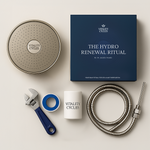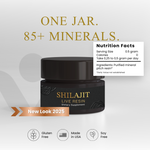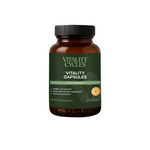Should Your Cardiologist Be Recommending Dog Ownership
Should Your Cardiologist Be Recommending Dog Ownership
Introduction and Topic Introduction
(0:00 - 0:15)
Hi, this is Dr. Daniels and welcome to Healing with Dr. Daniels. This is Sunday, December 1st, 2019. And today's topic is, should your cardiologist be recommending dog ownership? Yep, you heard that right.
Turpentine and Shilajit Preparation
(0:15 - 2:18)
I tell you, you cannot make this stuff up. But first, let us take some turpentine. Yay. So I have my unmarked bottle of turpentine. You should label yours though because unlike me, you probably do not live alone. So you don't want the hazard of someone else not knowing what's in the bottle and doing something inappropriate with it, like taking a swig or something.
All right. So this is about two and a half cc's, which is the same as half a teaspoon. And we have here some white sugar. And we're going to squirt this right here. Yep, you should see that getting nice and gray. And we have some distilled water. Yes. All right. That is done.
Now, we're going to take some Shilajit. Shilajit is black and tarry and tastes a tad bit icky. So we're just going to take a little paddle full of this. See how much is on there? About 200 milligrams. Put it in that water. Let it dissolve.
Now, usually I tell you I'm going to take it later and I don't get around to it. So I have some dissolved in water right here, ready to take. There you go. Now, leaving this in the water like this, it's going to dissolve and you'll see the water turns color as it dissolves. But usually, I get caught up and distracted by the show and don't get around to it. So today we have solved that problem.
Cardiologist Recommendations and Study Review
(2:18 - 4:45)
All right. So should your doctor, cardiologist, be recommending dog ownership? The first thing we have to take a look at here is, okay, what does your cardiologist recommend and how effective is it? And let's look at the evidence.
So there was a study that did this. I said, okay, we’ve got a bunch of people, they're average age 65 and they've had bypass surgery. We're going to presume this is for heart disease, right? Coronary artery bypass surgery, heart surgery for heart disease. Yay. And we're going to look at what their 10-year survival rate was. And so this is their 10-year survival rate with maximal medical intervention, right? They've got surgery, they're taking medicine, they've got a lifestyle change, all this stuff that they're doing.
So the question is, it's always nice to ask the question. That's how else can you possibly get the answer except by asking the question. So they took a look at these people who were average of 65 years old. And the question was, how long did they live? Well, it turns out that in 10-year period, only 70% of those who were alive at 65, this is average, only 70% were still alive in 10 years. Okay. And they've had maximal medical intervention.
Comparison with General Population
(4:45 - 5:40)
All right. Well, what if you're just a regular old American randomly walking down the street? What is your chance, if you're 65, of being alive 10 years later? Now, I happened to look that up, these actuarial tables, all this is known stuff. It turns out 79%. So 79% of healthy people, or I'll say undiagnosed people, will be alive in 10 years. But those who've had health problems, heart problems to be precise, and have had the standard of care, 30% of those will be dead, or 70% will be alive. So you can see already a 9% kind of loss.
Effectiveness of Lifestyle Changes and Medical Intervention
(5:40 - 6:43)
Well, the next question is, what about those folks who didn't get open-heart surgery, right? Heart disease, didn't get the standard of care. Well, what happened to those people? For this, we can look as far as a doctor called Dean Ornish, Dr. Ornish, and he did studies showing that lifestyle changes alone would reverse heart disease. In other words, would return that heart disease person back to the pool of random healthy people. Or I should say random people undiagnosed with heart disease. Okay.
So we got here then, and we have a 70% 10-year survival. And the question is, what can we do to improve that? And we have a control group, regular Americans, 79% chance of being alive in 10 years, from the age of 65. Now, if you had a whiz-bang, perfect drug, perfect surgery, perfect medical intervention that could restore a person to average health. In other words, that could take this person's chance of being alive in 10 years from 70% and increase it to 79%. I do believe we would call that a wonder drug.
Medscape Insights on Dog Ownership
(6:43 - 8:42)
You know what? We have something better than that. Yes, we have something better than that. And to find out about this something better, we only have to look to our friends at Medscape.
And this is what they say. They are awesome. I tell you, I like these guys. They do so much research and produce so much data. And it says, heart's best friend, dog owners have longer life expectancy after coronary events. So this is a group of people who are similar to our group of 65-year-olds who receive the standard of care and 30% were dead after 10 years. Let's see what dog ownership does.
I just, to clear the air, I do not own a dog. I did own a dog years ago, and it was a positive experience. But at the moment, I do not own a dog. Now, I also would like to say that this research was done on dogs, not cats, not birds, not hamsters, dogs. Okay. So we're going to go over what this study showed. So this is hot off the press, October 21st, 2019. A dog is not only man's best friend, but companionship from a dog may also have a positive effect on an owner's cardiovascular health. That's a big word for heart. Even lengthening their lifespan, holy cow, according to research.
Study Methodology and Findings
(8:42 - 12:33)
This is the essence of a prospective study and a meta-analysis looking at the cardiovascular risk and survival of dog owners. And so this is really a very strong study. So you just take a bunch of people and you observe over time what happens to them. And that is an extremely powerful type of study.
So these two studies provide good quality data indicating dog ownership is associated with reduced cardiac and all-cause mortality. This is important because you only die once. I know it may sound ridiculous to you, but here's the deal. If you have heart disease, take a pill, and you die two weeks later, not from heart disease, from something else. You don't care because you're just as dead. So what you really want the doctor to do, or anyone that's helping you, is to provide you an answer that's going to protect you from all causes of death over a period of time.
So, and this is a failure of many heart disease interventions, whether it's a high blood pressure medication, whether it's taking cholesterol-lowering drugs, oh yeah, oh yeah, your heart disease death rate goes down. But all the other causes of death rise up so high that there is no benefit to your longevity. But again, as an individual, the thing is, you only get to die once. So if you eliminate one cause of death or minimize it while increasing other causes of death, you really haven't gained anything because you'll be just as dead and you're dying just as soon.
So what you really want is something that's going to increase what's called all-cause mortality, which is going to increase your absolute chance of being alive for a longer period of time into the future. We're not talking immortality here, just maybe making it another 10 years. Yeah. And so this was shocking.
Based on previous studies, which had shown that social isolation and an inactive lifestyle have a negative impact, researchers want to establish to what extent dog owners will get health benefits from the companionship of their four-legged friends.
So they know that a person's social situation, like whether you're divorced or whether you're employed, certain social circumstances have an impact on a person's longevity. And so then the question was, Hey, what about dog ownership?
Meta-Analysis and Mortality Reduction
(12:33 - 19:02)
And so it's a meta-analysis and they've had 10 studies follow up of up to 22 years. So this is a long period of time over which they looked. And most of them are from Scandinavia and England in which the connection between dog ownership and reduced mortality was investigated. And so they looked at all these studies, pooled them together, and what did they find? The findings were profound. The conclusion was that owning a dog significantly improved longevity and health outcomes. And so this is what they found.
Dog owners had a 24% reduction in mortality rates, all-cause mortality, including all causes of death. In those who had cardiovascular disease, the mortality rate was reduced by 31%. So that's huge. And if you say, you say, well, I don’t have heart disease. Okay. For the general public who doesn’t have heart disease, the mortality rate was reduced by 20%. And these studies were not just one study but included multiple studies.
In summary, if you are a dog owner, you are significantly better off with your longevity, your survival rate, and your all-cause mortality. You know, we were talking about people with heart disease and 30% of them being dead within 10 years with the standard of care. But if you have a dog, your survival rate is increased. Your chance of being alive 10 years later is significantly improved.
So, if you're looking for a benefit of getting a dog and you have heart disease, you know what? Go out and get a dog because it is significantly helpful. In fact, this study, all these studies that we’re looking at, you know what, maybe this is better than the medicines that are available, better than the surgeries that are available, maybe.
Personal Experiences and Recommendations
(19:02 - 22:40)
And if you’re not a dog owner, you might want to reconsider. Of course, you need to consider your own lifestyle, preferences, and circumstances. But having a dog, if you’re able to manage the responsibility and have the right environment, can offer significant health benefits.
To recap, studies show that dog ownership has a profound impact on longevity and health outcomes. Dog owners experience a reduced mortality rate of 24% overall and a 31% reduction in mortality specifically related to cardiovascular disease. This data supports the idea that the companionship and activity associated with owning a dog provide valuable health benefits.
For those with heart disease or at risk, incorporating a dog into your life could be a simple, yet effective way to enhance your health and potentially improve your survival rate. It’s an accessible, non-pharmaceutical intervention that can make a meaningful difference.
If you’re considering getting a dog, think about your ability to care for it properly. Dogs require time, attention, and resources. However, the potential health benefits might outweigh the challenges if you’re prepared for the commitment.
So, in conclusion, your cardiologist might not directly recommend dog ownership, but the evidence suggests it could be an excellent addition to your health regimen. I hope this information has been helpful and gives you something to consider as you think about ways to improve your health.
Closing Remarks and Outro
(22:40 - 34:28)
Thank you for joining me today on Healing with Dr. Daniels. I’m Dr. Daniels, wishing you good health and happiness. See you next time!
Stay tuned for our next episode where we will explore the benefits of a plant-based diet and its impact on cardiovascular health. We’ll dive into the science behind plant-based nutrition and share practical tips for incorporating more plant-based foods into your daily life.
If you enjoyed today’s discussion, please consider subscribing to the podcast and leaving a review. Your feedback helps us continue to provide valuable content and support more listeners on their health journey. Also, follow us on social media for updates and additional resources.
For any questions or suggestions, feel free to reach out to us at healingwithdrdaniels@example.com. We’re always eager to hear from our listeners and value your input.
A special thanks to our research team and contributors who make this podcast possible. Your dedication and expertise are greatly appreciated.
[Upbeat outro music plays]
Thank you for listening to Healing with Dr. Daniels. Until next time, take care and stay healthy!


